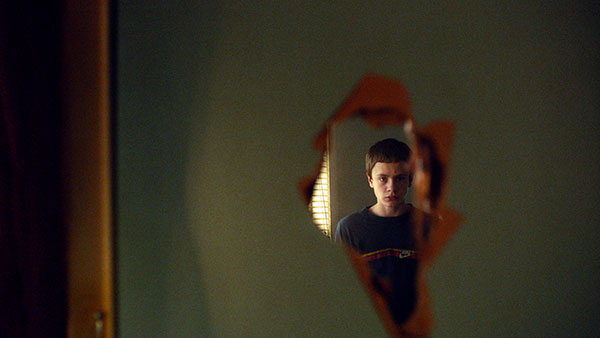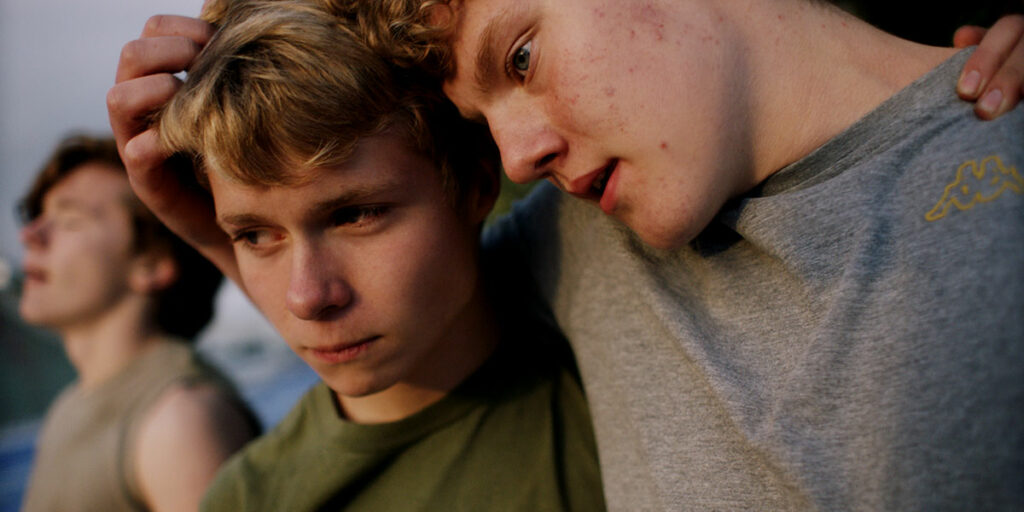Guðmundur Arnar Guðmundsson’s Beautiful Beings poignantly explores the violence and tenderness of teenage boys, but a lack of consequences make it feel unsettled.
‘Boys will be boys’, a saying that’s often trotted out to explain and excuse the behaviour of adolescents. It’s used to brush aside the sometimes thoughtless, sometimes malicious things they do to themselves and each other whilst navigating the hormonal minefield that is growing up. In Guðmundur Arnar Guðmundsson’s Beautiful Beings (Berdreymi), the complex web of emotions between a group of boys is explored through violence, prophetic dreams and a frustrating lack of consequences. But the film doesn’t seek to condemn or critique the boys, instead offering a glimpse into the darkness that festers in the traumatic home lives, the lack of stimulation and the casualness of drugs and violence for Iceland’s fringe youth.
Balli (Áskell Einar Pálmason) is mercilessly bullied, to the point of hospitalisation and the involvement of news crews. He’s often left alone by his drug addicted mother and abusive stepfather with little food and a house that’s consistently dirty and untidy. Addi (Brigur Dagur Bjarkason) takes pity on him and starts inviting him to things, bringing him bits of spare food and helping to clear up his house, much to the chagrin of his volatile best friend Konni (Viktor Benóný Benediktsson). But soon Addi starts having strange dreams, prophetic feelings like those his psychic mother often talks about, and the boys head down a road of violence that could irrevocably change Addi’s life.
Beautiful Beings is a film that navigates the awkward spaces in the friendships of teenage boys, where cruelty and caring overlap in strange ways. In between the moments of mockery and violence, there’s a tenderness to the way they interact with each other. One minute they’ll be pushing and shoving, and the next they’ll embrace. For all Konni’s posturing and violence, he’s a boy terrified of his own father and dealing with the aftermath of assault. He carefully helps Balli wash his hair, and then bursts into a party and beats someone to a pulp within the space of a few hours. It’s an empathetic approach to a character that could easily just be a conduit for violence, but instead is a boy whose actions stem from what he knows: fear and fists.

Addi’s the most sensitive of the group, the one who is told secrets and is most willing to offer comfort. It’s a fantastic performance from Bjarkason, whose vulnerability and raw edges give affecting dimension to a character that struggles to express himself amidst dealing with some pretty dark situations Addi’s sparse narration threads through the film, and it’s his anger, joy and fear that audiences are encouraged to connect to. Guðmundsson’s frames his dreams and prophetic ‘bad feelings’ as the means in which Addi asks hard questions, seeks out answers and offers help, however misguided the attempts may be. His dreams unsettle both him and the viewer, but don’t stray as far into the fantastical as they might have, given Iceland’s propensity for folklore and evocative imagery. The film doesn’t particularly delve into how Addi feels about their existence or what they actually symbolise within him, rather leaving it open to interpretation, but they add an ominous nature to a film that’s already quite dark.
And Beautiful Beings is not afraid to explore some pretty heavy themes, with emphasis on bullying and abuse, as well as the prevalence of drugs and alcohol. It’s a film that intends to make the viewer uncomfortable, unflinchingly portraying cruelty, sexual violence and self-harm in a way that, while not exploitative, emphasises the bleakness of Addi, Balli and Konni’s circumstances. But in what is perhaps the film’s main flaw, Guðmundsson doesn’t explore the consequences of such heavy material in any great depth. It brushes aside the need to confront trauma, lets explicit acts of violence go largely unresolved and lets the boys fester in their rage, anger and desperate sadness.
It leaves the film itself feeling… unsettled. It ends poignantly, if a little sombrely, and gives breathing room to its darkest moments throughout its runtime. But the depictions of heavy violence are ultimately without any significant consequence, meaning the resolution isn’t as satisfying as it could have been, had the film fully explored the ways in which such an environment affects boys like Balli and Konni. Violence is suggested to be a natural symptom of their teenage boyhood, but it feels as though Guðmundsson sets out to show it as the result of trauma and succeeds for the most part. It just might have felt a little more authentic to have there be direct consequences for the decisions Addi and his friends make, rather than an apparent brushing of it all under a dirty rug.
But while Beautiful Beings might stumble a little in its intense climax, for the most part it’s a film that’s very evocative and moving. It shows teenage boys who feel so deeply, but are powerless to truly tackle the roots of their anger. It shows a tenderness and a closeness in male friendships that’s often overlooked, and features a host of exquisite young Icelandic talent. It’s a film that doesn’t necessarily evoke joy, but watching it is quite powerful regardless.
Beautiful Beings opened at Quad Cinema (New York) on January 13 and at Laemmle Glendale (LA) on January 20, 2023. The film will be released on VOD on April 25.

